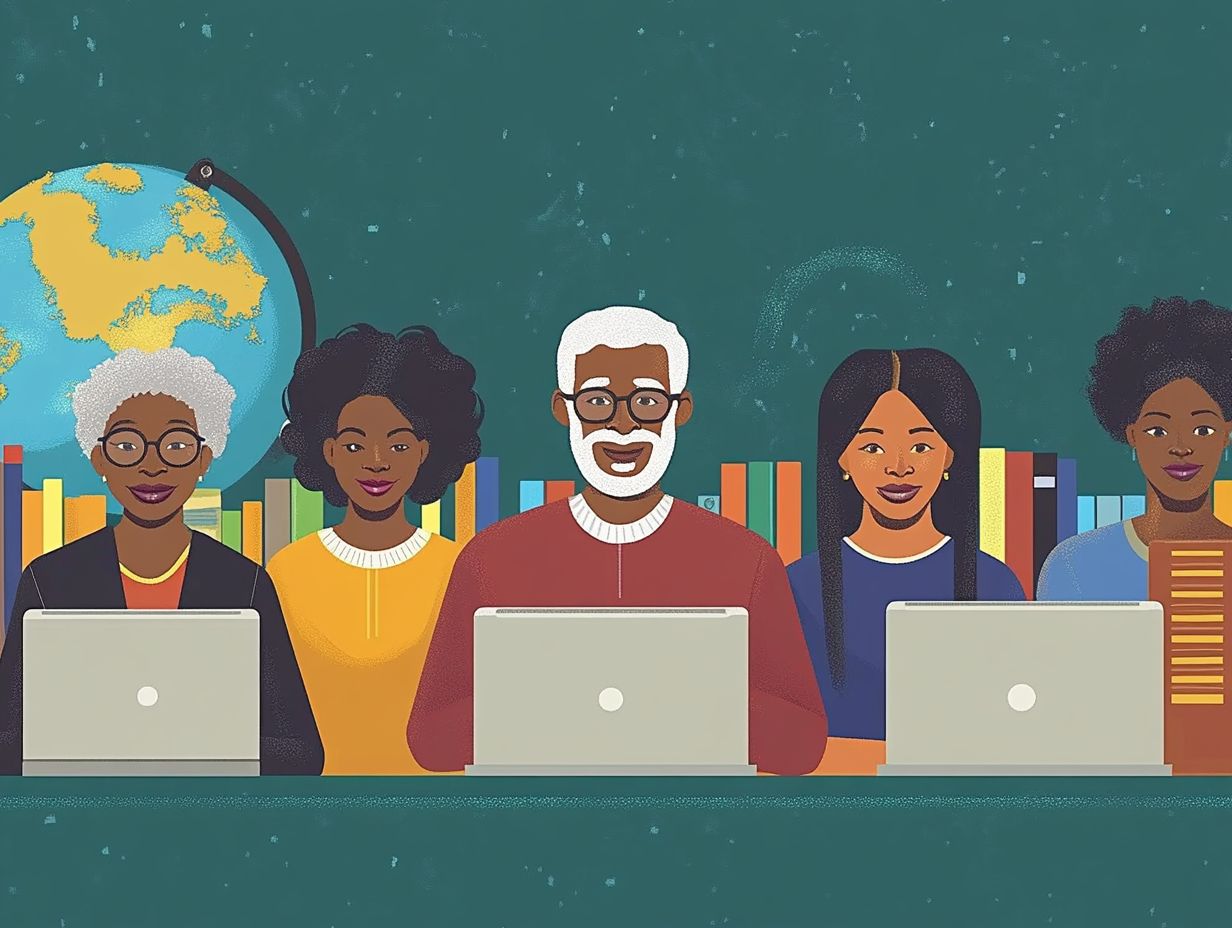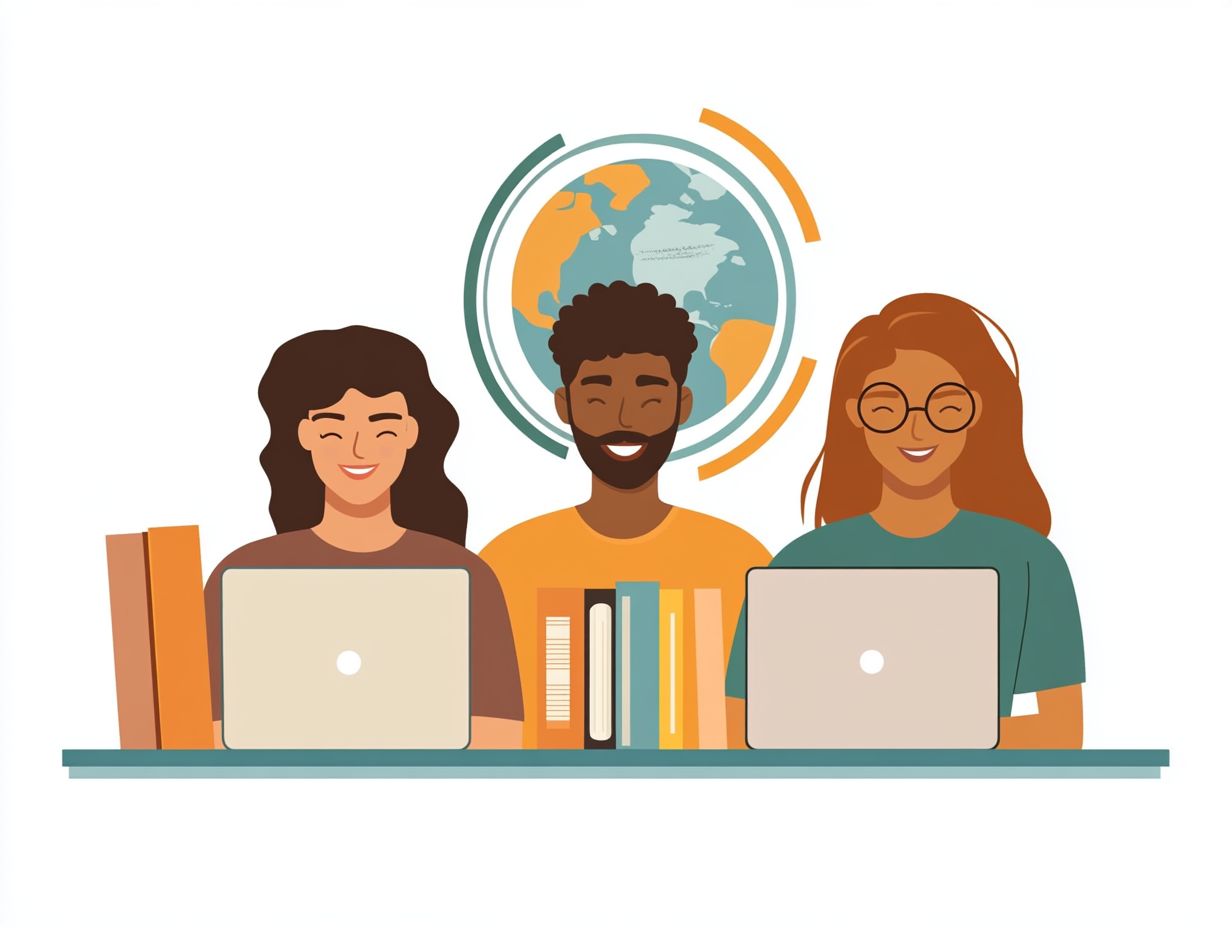The Impact of Online Bachelor’s Degrees on Lifelong Learning
The landscape of higher education is evolving at a remarkable pace. Online bachelor’s degrees are becoming a favored option for many students who don’t follow the typical college path. This shift mirrors broader trends in online learning, fueled by an ever-increasing demand for flexibility and accessibility in education.
While these degrees provide notable advantages think cost savings and the ability to juggle studies with your work and family commitments they also come with their own set of unique challenges.
Let s explore the rise of online bachelor’s degrees, examining their impact on lifelong learning and what the future may hold for this burgeoning educational trend.
Dive in to uncover how this innovative format is reshaping access to higher education and enhancing professional development opportunities for individuals like yourself.
Contents
- Key Takeaways:
- The Rise of Online Bachelor’s Degrees
- Benefits of Online Bachelor’s Degrees
- Challenges of Online Learning
- The Impact on Lifelong Learning
- Future Outlook for Online Bachelor’s Degrees
- Frequently Asked Questions
- What is the impact of online bachelor’s degrees on lifelong learning?
- How does pursuing an online bachelor’s degree support lifelong learning?
- What are some benefits of earning an online bachelor’s degree for lifelong learning?
- Can online bachelor’s degrees be considered equivalent to traditional degrees?
- How do online bachelor’s degrees impact career development and lifelong learning?
- What are some challenges associated with pursuing an online bachelor’s degree for lifelong learning?
Key Takeaways:

- Online bachelor’s degrees offer flexible and accessible learning.
- They are often more affordable, broadening access to education.
- These degrees support ongoing professional development.
The Rise of Online Bachelor’s Degrees
The emergence of online bachelor s degrees has revolutionized the educational landscape. Students now have unprecedented access to higher education.
With flexible scheduling and modern online learning platforms, you can tailor your education to fit your lifestyle. Institutions like Boise State University lead the charge, offering a diverse range of online degrees that cater to your aspirations for academic excellence and career advancement in a fast-paced job market.
As distance learning continues to flourish, you have the unique opportunity to enhance your qualifications and pave the way for a brighter future.
Overview of Online Learning Trends
Online learning trends highlight a remarkable transformation in educational delivery. Distance learning is becoming the favored choice for many students in today s digital landscape.
Hybrid programs are emerging and supporting this trend by combining online and in-person instruction to cater to various learning preferences.
Innovations like virtual reality and artificial intelligence are changing how you engage with course materials. These tools offer immersive experiences that deepen understanding and enhance retention.
According to the National Center for Education Statistics, nearly 37% of higher education students were enrolled in distance education courses in fall 2020, illustrating a growing comfort with digital platforms.
Employers are increasingly acknowledging the value of digital credentials, opening new doors for graduates in the ever-evolving job market.
Benefits of Online Bachelor’s Degrees
Online bachelor’s degrees present an array of advantages, providing you with unparalleled flexibility and accessibility. This allows you to customize your educational journey to seamlessly align with your unique schedule and lifestyle, ultimately enhancing your potential for success as a student.
Flexibility and Accessibility
Flexibility and accessibility are the cornerstones of online learning. These programs cater specifically to students seeking adaptable solutions for their educational needs.
They have transformed education for those balancing the demands of work and family, enabling you to pursue your academic goals on your own terms.
For example, Boise State University offers a variety of fully online degrees, allowing you to fit coursework around your job commitments and parenting responsibilities. Research shows that nearly 60% of online learners enroll in distance programs primarily due to their flexible scheduling options.
Similarly, institutions such as Arizona State University have implemented innovative strategies, including asynchronous class structures and varied assignment deadlines, to accommodate diverse lifestyles and enhance your engagement as a student.
Ready to take charge of your education? Discover an online program that fits your goals today!
Cost Savings

One of the most compelling reasons to choose an online degree is the significant cost savings associated with pursuing higher education in a virtual format. This affordability comes from various factors that together create a more economical learning experience.
For instance, you can often eliminate commuting costs entirely, which can add up to hundreds or even thousands of dollars each year, depending on your distance from campus and chosen travel methods.
Many students appreciate how online education allows them to maintain full-time or part-time jobs while studying, making it easier to generate income and manage expenses.
Tuition fees for online programs are often lower than those at traditional colleges, with some universities even offering discounts specifically for online learners. A recent survey revealed that students enrolled in online courses saved an average of 37% on tuition compared to their on-campus counterparts.
These financial advantages make online education a fantastic choice for those looking to save money!
Challenges of Online Learning
Online learning offers a wealth of benefits, yet it also presents its own set of challenges that can influence your experience.
You ll need to use technology effectively, tackle a steep learning curve, and address concerns about how potential employers view digital credentials.
Technology Requirements and Learning Curve
Technology requirements and the learning curve are important in your online learning journey, as you use various digital platforms and tools to achieve your academic goals.
To engage effectively with the material, you need to master essential skills like the ability to use technology and the internet effectively, proficiency in tools that help you work with others online, and an understanding of online communication etiquette.
Instructional designers are your allies in this process, offering tailored support and resources that bridge any technology gaps you might encounter.
Through clear tutorials, user-friendly guides, and proactive assistance, these professionals help you build confidence in your technological skills.
You can further tackle these challenges by dedicating time for practice, seeking peer support, and tapping into online forums to deepen your understanding. This proactive approach will ultimately enhance your overall learning experience and set you up for success.
Perceived Value and Credibility
The perceived value and credibility of online education is worth exploring, especially as students like you may worry about how employers will view their digital credentials.
Fortunately, a growing number of companies are beginning to shift their perspectives. They recognize that online degrees can showcase your adaptability and commitment to lifelong learning.
Industry experts, including Adam Eschbach, point out that some organizations actively seek candidates with online qualifications, appreciating the innovation and self-discipline such programs cultivate.
However, it s essential to note that, as Sam O’Donnell highlights, traditional educational backgrounds still hold considerable weight for many employers, creating a bit of a tug-of-war in hiring practices.
As the job market evolves, the acceptance of digital credentials is set to transform further, opening up diverse educational pathways that could work in your favor.
The Impact on Lifelong Learning
The influence of online bachelor’s degrees on lifelong learning is significant, as highlighted in the impact of online education on traditional bachelor’s degrees, offering enhanced access to higher education for nontraditional learners.
This flexible approach not only broadens educational horizons but also cultivates opportunities for ongoing professional development across diverse fields.
Don t wait! Start your online education journey today!
Increased Access to Higher Education

Increased access to higher education through online learning has opened doors for countless students who don t follow the usual education path. Many may have previously been marginalized by traditional educational pathways.
You often juggle various responsibilities from full-time jobs to family obligations making flexible learning solutions essential. Institutions such as Northeastern University and UC Online have tailored their programs to cater to your diverse needs.
By offering asynchronous courses and various degree options, they enable you to balance your education with your career and home life seamlessly. Imagine achieving your dreams while working!
Many students have successfully completed their degrees while managing two jobs or raising children. These success stories demonstrate that online education is not merely about acquiring knowledge; it cultivates an inclusive environment where you can realize your academic and professional aspirations.
Continued Professional Development
Continued professional development is crucial in today s fast-paced job market. Pursuing an online degree offers you a flexible pathway to enhance your skills and advance your career.
By embracing online education, you can weave your studies into your busy life, gaining new qualifications while maintaining your current responsibilities. Programs like Boise State University s Master of Business Administration and specialized certifications in project management or information technology are designed for individuals like you.
Institutions such as the University of Illinois at Urbana-Champaign and Oregon State University provide options tailored to your unique needs, cultivating an environment where career advancement and lifelong learning thrive.
This flexibility not only helps you remain competitive but also equips you with cutting-edge knowledge that you can apply immediately in your field.
Future Outlook for Online Bachelor’s Degrees
The future of online bachelor’s degrees looks exceptionally bright for you, with promising growth fueled by the role of technology and innovative digital solutions. These developments are set to enrich your learning experience and widen access to high-quality education.
Potential Growth and Advancements
Potential growth and advancements in online education like hybrid programs, which combine online and in-person learning, and innovative digital credentials are poised to transform your experience in higher education in the near future.
These developments promise to enhance accessibility, elevate engagement, and improve outcomes for you.
By harnessing advanced technologies like virtual reality, interactive platforms, and personalized learning analytics, institutions can create enriched environments that make you feel connected and motivated.
With flexible scheduling and a variety of learning tools at your disposal, you can participate and thrive, breaking down traditional barriers that once held you back. This new era of education also facilitates continuous feedback and adaptation, ensuring that your learning experiences evolve to meet your unique needs.
Frequently Asked Questions
What is the impact of online bachelor’s degrees on lifelong learning?

The impact of online bachelor’s degrees on lifelong learning is significant. It provides individuals with the opportunity to continue their education and develop new skills at any stage of their life, regardless of their location or schedule. Similarly, understanding the role of online master’s degrees in lifelong learning can further enhance these opportunities.
How does pursuing an online bachelor’s degree support lifelong learning?
By pursuing an online bachelor’s degree, individuals can continue to learn and acquire new knowledge and skills while balancing responsibilities like work and family. This promotes a lifelong learning mindset and encourages personal and professional growth, especially when considering the impact of online learning on doctoral success.
What are some benefits of earning an online bachelor’s degree for lifelong learning?
Earning an online bachelor’s degree offers many benefits. It lets you learn at your own pace and connect with a diverse group of students.
The flexibility and convenience make it easier to balance learning with other commitments. You can access a wide range of resources anytime, anywhere.
Can online bachelor’s degrees be considered equivalent to traditional degrees?
Yes, online bachelor’s degrees are equivalent to traditional degrees. They cover the same course content and academic standards.
The main difference is the delivery method. Online degrees use technology to provide materials and facilitate communication with instructors.
How do online bachelor’s degrees impact career development and lifelong learning?
An online bachelor’s degree can significantly boost your career. It helps you gain relevant skills and knowledge, making you more competitive in the job market.
This continuous learning approach encourages you to seek new personal and professional growth opportunities throughout your career.
What are some challenges associated with pursuing an online bachelor’s degree for lifelong learning?
Pursuing an online bachelor’s degree can be challenging. Time management, motivation, and work-life balance are key issues to navigate.
Technical problems and the lack of face-to-face interaction can also be hurdles. However, with determination and planning, you can overcome these obstacles.






